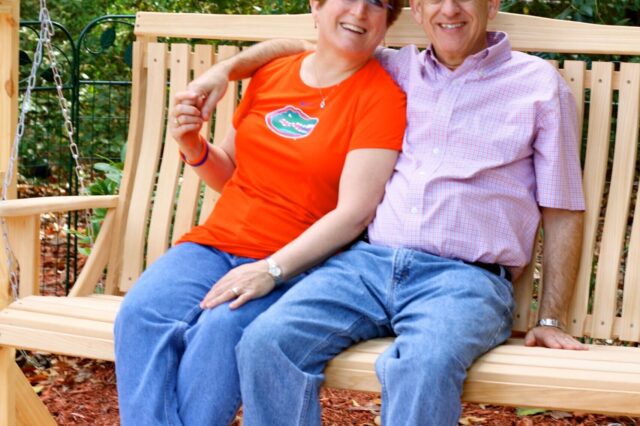Sweet relief, sweet dreams

For 15 years, Bob Cohen kept tossing and turning in order to stay alive.
Cohen, a resident of Gainesville since 1988, has always been active, loves to read non-fiction, plays chess and enjoys biking. He is an environmental consultant for the state government, practices mediation and is on the Gainesville Police Advisory Council. But his sleep apnea, a disorder where breathing is paused during sleep because of an obstruction to the airway, was taking a toll on his home and work life. Cohen said he was tired all the time and could not sleep for fear of not waking up.
When Cohen would sleep on his side, he had moderate sleep apnea, an apnea-hyponea index, or AHI, of 15 of more. AHI is the average amount of times an individual ceases breathing within an hour. When he slept on his back, he would have an AHI of 60 or more (severe sleep apnea). The risks of untreated severe sleep apnea includes the desaturation of the oxygen blood supply, tiredness and in extreme cases enlarged heart leading to other heart problems.
The standard treatment for sleep apnea is to use a continuous positive airway pressure, or CPAP, machine. But about 30 to 50 percent of people can’t tolerate the CPAP machine and Cohen was one of them.
Alternatives to the CPAP machine was a procedure Cohen referred to as a “nasty surgery” where doctors would have to rewire Cohen’s jaw, known as Maxillomandibular osteotomy and advancement. He did not want that procedure.
Another option is the use of a mandibular adjustment device, a dental device that looks like a mouthpiece which is molded to the patient’s mouth to gently pull the lower jaw forward to open the air passage while sleeping. Cohen had one made, but there was only one problem: he had all his teeth. There wasn’t enough room in his mouth and it became very uncomfortable. As a result, he would have to take it out every two or three hours.
“It served as an aid, but not as a solution,” Cohen said. “So then, I read about the Inspire Therapy® and made an appointment to see Dr. Harwick, who is the only one in Gainesville who does this treatment.”
Inspire Therapy® device is a FDA-approved upper airway stimulation device that help patients suffering from moderate to severe obstructive sleep apnea. John Harwick, M.D., an otolaryngologist at UF Health ENT and Allergy – Hampton Oaks, helped Cohen in his journey to counting sheep.
In order to qualify for the procedure, patients have to go through a bronchoscopy assessment, where an anesthesiologist gradually induces sleep while the doctor uses a scope to see how the patient’s windpipe collapses. It has to collapse in a certain pattern for the device to work.
Once approved for the therapy, Cohen was one of the first few patients at UF Health to ever receive this implant. In September 2016, Harwick implanted the three-part device in Cohen through three, two-inch-incisions, just under the skin. One was in the right upper-chest, one under the arm and another under the neck. It detects when a person is breathing and sends little electrical stimulations to their muscles to move the tongue slightly preventing the airway from collapsing. Cohen has a remote control that he can use to turn the device on and off. He turns it on when he goes to sleep and if he wakes up during the night he can push the button on the remote control and it will pause for 20 minutes, so that he can go back to sleep.
“It was a great relief to meet Dr. Harwick,” Cohen said. “He is brilliant and he knows what he is doing. I was impressed by his professional ability and his excellent bedside manner.”
Cohen has had diverse life experiences from writing a book while he was in the Peace Corps titled “Perfect Questions, Perfect Answers” that has been translated in over 40 different languages to helping design the newly renovated Plaza of the Americas on the University of Florida campus. Now that he is able to sleep, all he wants to do is retire and write another book.
“Life is never dull,” Cohen said. “I can’t complain about that.”